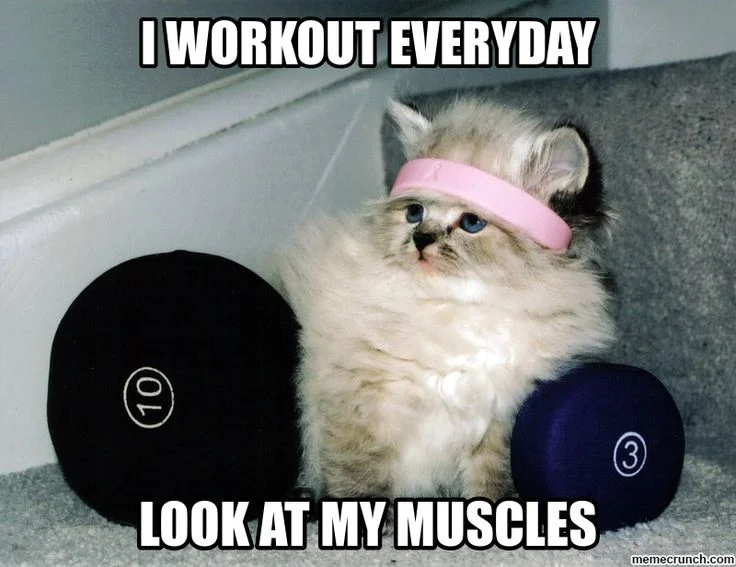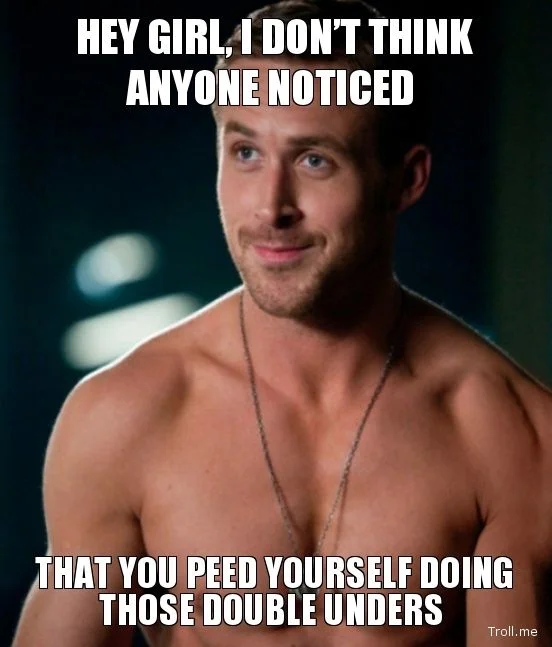Last week I went over pelvic floor anatomy and function. This week we’ll keep with the pelvic floor (PF) theme and talk about PF function during exercise! I know, when you're working out the last thing on your mind is what those PF muscles are doing. Unless you're like me and are thinking about that... but anyways. All those muscles are working overtime when you're working out.
How does the pelvic floor function during exercise?
The job of these muscles doesn’t change, but it sure as heck gets more difficulty. The pelvic floor muscles are still supposed to stop you from peeing and pooping when you don’t want to, and keep all of your organs inside your body. In order to do this, they need to be both strong and well coordinated.
When you workout, cough, laugh or sneeze there is an increase in intra-abdominal pressure. Yep, that simply means the pressure in your abdomen increases. As this pressure increases your PF muscles also have to work harder to prevent any leaking. That means these muscles need to be able to generate a strong contraction.
Muscle coordination is another key component to staying dry. These muscles are always working (remember: tone) but they also need to have a quick response time to handle those sudden increases in pressure. When you jump, cough, sneeze, or laugh the increase in pressure is temporary and happens quickly. A strong contraction won’t help if it happens too late!
You might be thinking, ok is this really that big a deal? Well one study found that close to 30% of women report leaking during some type of exercise. That's a pretty high number, but researchers know that leaking is typically under reported so the real statistic is likely to be even higher. For example, one study found that over 1/3 of people with incontinence did not report their problem to a caregiver.
Incontinence reaches even higher stats when we examine high level female athletes. It ranges from 28-80% and was most commonly reported by gymnasts, trampolinists, hockey players, and ballet dancers. Interestingly enough, athletes report more leaking during the end of a training session or competition. This ties back to strength and coordination, both of which get worse as you become more fatigued.
The common theme here? Lots of women are leaking with exercises and it's not okay! (Psst, men can have this problem as well, but there isn't as much research on it quite yet.)
Leaking during exercise means you have pelvic floor dysfunction
Doing crossfit? You shouldn’t leak. Jumping jacks? You shouldn’t leak. Powerlifting? You shouldn't leak.
What's better than Ryan Gosling shirtless? Trick question, probably not much - but not peeing yourself when you workout is pretty darn close!
If you leak during exercise but not during day to day activities... guess what? You are still dealing with incontinence! I hope you didn't forget about the female athlete triad. Several studies have found that athletes with eating disorders are also more likely to have problems with incontinence. And if you're working out, go ahead and consider yourself an athlete.
And voluntarily peeing during a workout is bad too
Not to pick on runners, but I’ve heard of one bad habit in particular - peeing during a run. This is a huge no-no! I get it. You can’t exactly stroll into a bathroom mid-race and you also don’t want to get dehydrated.
However, peeing as you exercise teaches your body that it’s okay to let go and void during a functional activity. Every time you do something, your brain reinforces that pattern of muscle use and recruitment. You do not want to teach your brain that it’s normal to let your pelvic floor muscles relax when you are doing strenuous physical activity!
The Big (Dry) Picture
It's not all bad news bears here. I'm not trying to scare you into never working out again because you leak a little. Exercise has a ton of great benefits, one of which is strengthening those PF muscles. Several studies have found that low impact, long term exercise has a protective effect against incontinence.
The takeaway from this post is that you need to be sure your muscles are ready for the exercise you are doing. Hopefully you wouldn't run a marathon if you can't walk 2 miles. Same for PF function. You can do high impact or highly strenuous types of exercises, but your PF muscles need to be just as ready for it as your quads or shoulders.
Maybe your muscles need to get stronger or more coordinated, or a little of both. Pelvic floor physical therapy has been shown to be very effective in treating this problem. Remember, it's always easier to treat a problem when it is just beginning then when it's been going on for decades so don't be shy about getting help now.
And if all that didn't convince you, maybe this will. The best predictor of whether you are going to have problems with incontinence later in life, is if it happens when you are younger.
Resources:
Urinary incontinence in physically active women and female athletes, from the British Journal of Sports Medicine 2014.











